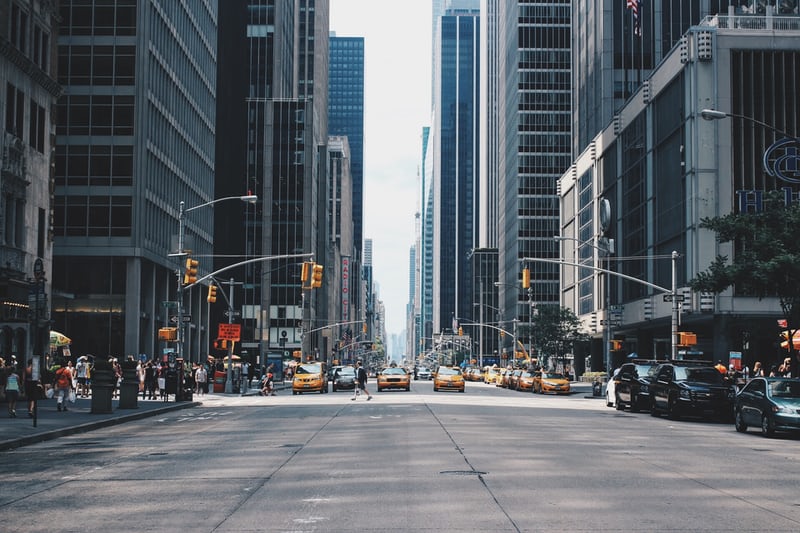No doubt Americans reassessed their living and work situation during the pandemic and some are paying a price.
Due to the low-interest rate environment, burnout, attractive mortgage rates and the unbreathable living situation stuck at home, millions decided this past year and half they don’t deserve their bedroom to be their kitchen, yoga studio, pet center, day care center and office anymore.
Yet with a staggering 80% of homebuyers who report REGRETTING the purchase of their property, majority clueless Millennials who wanted to feel free and make a spontaneous home buying decision, read more here, now they not only have to pay for something they don’t like, they have to figure out a plan to find the funds.
New York Is Legit
The truth is not everyone can just pick up and leave. If we all could, we would. No one wants to be in the highest marginal tax bracket, pay $6 for water and have to deal with a cramped sweaty subway to get to work. Everyone has their reasons for being somewhere. It might not be smart for you but it’s their life and have to pay a price for it.
If everyone could, they would be in Florida paying 0 income + corporate tax working on the beach.
Not all jobs are remote and not all of us are self-employed. Although employers are having a hard time hiring with the new wave of entrepreneurialism and influencers, it still isn’t prevalent amongst majority of Americans.
In replace of higher costs of living in cities, there are higher salaries. Now don’t get me wrong. The more earned income you earn, the more you pay in taxes but that still doesn’t seem like an issue to city dwellers since they are here for a different reason.
Yes, New Yorkers acknowledge it’s only getting more expensive and not always worth it, yet that’s their choice and many still won’t leave because they simply love their job, city life and the culture that’s unmatchable elsewhere.
Just because there’s an alternative option that works better for someone else, doesn’t mean it’s best for others. Over this past year as I’ve walked around the city gazing up at empty office buildings and shuffling my way around record number of registered cars, for some reason I felt a sense of not belonging.
The pandemic bashed cities for their harsh mandates and lockdowns. As higher income families fled to their beach homes with the luxury of remote working, all that were left were business owners, mostly immigrants of stores that were allowed to stay open which sold essential goods and want-to-be hip Millennials and GenZers from rural America who ventured out to the Big Apple taking advantage of low travel costs.
As a life-long resident of New York who’s been stuck here ever since March 2020, I felt I didn’t belong walking on the streets since everyone was advertising and boasting about all the land they got with their new property in Nashville or Ohio.

To Be Or Not To Be
For those who aren’t making an affordable wage in a city working 2–3 jobs trying to stay afloat on minimum wage, this is your chance to move out NOW before interest rates creep up, inflation hits regular goods such as food staples and gas and mortgage rates skyrocket.
With the median duration of 8 yrs for homeownership, the largest indicators of someone moving are:
-Job relocation
-Mortgage too expensive
-Better community for schools, cleaner environment overall living satisfaction
Yet during the pandemic, most residents did not weigh all of these options. Unless they were unemployed or got laid off, most home buying happened without much decision making only based on comfortability and FOMO.
The worst time to buy a home is when you think you need one versus really need one. Cheap financing rates can’t be your sole reason. Let’s say your job is relocating, you found a good deal on a house and know a great neighborhood your kids can grow up in in rural Utah.
Even if mortgage rates skyrocket to 6% and prices inch upwards which are happening till today and there’s no slowing down since lockdowns began, if now’s the right time based on your needs, it’s better to go for it than when things are cheap and you have temporary emotional wants.
Buying a home is a hassle and there are dozens of fees that aren’t refundable that go into the process. From appraisal fees to broker-dealings and closing costs, buying a home you know you will have for at least a decade is key. Unfortunately, most people don’t follow this rule anyway and end up loosing money on their property because they move out too soon and their mortgage and renovation costs eat up into the price.
Rule of thumb: everything is more expensive than it seems and unexpected costs will come up because things break down.
That’s why I suggest rent luxury, buy utility. We are creatures of change. We aren’t meant to stay in the same place for 10 years. If you know a property won’t be sustainable and realistic for you to live in for the next few years, then don’t go for it. A property is only an asset if you sell it for more than you purchased it for.
More affordable places are great incentives but that doesn’t mean Manhattan or San Francisco are out of the picture. With the median home price in these coastal cities ranging from $800k-2m, this is out of budget for 90%+ of Americans and most cannot fathom how they could ever afford anything here yet that’s where a little creativity and agreement comes into play.
Ever heard the saying, “if you can make it in New York, you can make it anywhere?”
Younger generations fresh out of school who come to explore career opportunities in cities don’t expect to pay for everything on their own, let alone live on their own. With the help of their parent’s bank and roommates, they make the dream work. Sub-leasing is a common way of living for new city dwellers and the most effective to get the most bang out of your buck plus the more people you meet in a city, the better. It’s a melting pot of diversity and innovation.
If you are fortunate to have a great job in a city at a top-tier company that’s been booming during the pandemic in the industries of financial services, healthcare, automobile, insurance or real estate, unless the hours are killing you and you absolutely hate the people, which could be a valid concern, then weigh your options and express to your manager your concerns before moving because people would be dying to be in your position.
If there’s a will, there’s a way.
A new house in a new town may not always be your best option.

Breakdown
Leaving cities isn’t entirely new. Big city residents have been moving to suburbs and smaller metro areas for centuries to raise families and breathe fresh air. The pandemic has only supercharged that phenomenon.
Millennials accounted for more than half of all new home loans in 2019, the most-recent data available, according to Realtor.com. In 2020, the moves accelerated when many began working from home with no need to commute. At the same time, mortgage interest rates hit historic lows and they foolishly followed that incentive the most.

Investing
I’ve been keeping an eye out for big city living throughout the pandemic as the price of lumber and high demand have led prices to soar and 30%+ of homebuyers to pay above asking price for a property they’ve never set foot in.
As I purchased my first rental property to lease out to my new set of tenants at the height of the pandemic, you can read here how the process went, I’m continuing to look out for buying opportunities to diversify my portfolio.
What’s fascinating about real estate as an investment class is that you can earn more return by taking on less risk. When it comes to equities or other investments, that’s usually never the case. Plus it’s tangible!
Granted, it’s a lot of work. Managing tenants is a hassle and I’m not sure if I want to buy another New York property. The only way I would rent out a place across the country is if I invested through crowdfunding platforms such as Fundrise, CrowStreet or just invest in REITS (Real Estate Investment Trusts) via the market.
I don’t want to have to manage my tenants 6k miles away. The beauty about these investing platforms is that you can take advantage of properties across the country with no maintenance, extra costs/fees built into purchasing the physical asset or deal with the hassle of finding tenants. If you want exposure to booming rural heartland America, then this is your time.

Unknown Lands
Des Moines, Iowa, Prevo, Utah, Hilton Head, South Carolina?
Where are they?
What do these small unknown cities have in common?
Dozens of financial institutions are proposing to move to low or zero income tax states such as Florida and Arizona. Even the NYSE (NY Stock Exchange) had some talk late in 2020 about moving to Miami. I doubt it will happen but the proposal justified the fact that taxes are a burden.
Not just billion dollar firms are seeing the extra benefit of a hybrid remote work lifestyle, so are small businesses and branches of these large companies. Most assume coastal cities just house the big banks, pharmaceuticals and startups. Yet countless firms are relocating to smaller cities and towns they’re just typically branches or merchants not high-rise buildings.
As we’ve witnessed tech behemoths such as Tesla move their operations to Texas to sit on unrealized gains (not paying capital gains tax on their investment gains) they are bringing a host of high-tech jobs and industries that want to follow.
I believe robotics in the healthcare, farmland agricultural/food space and automobile/EV space will be huge in the next few years looking to establish a base in low-cost friendly cities. Besides affordability, industries are posed to do well in areas with more space, less pollution and stronger connections/roots.
Metro areas have staying power but there’s no doubt coastal cities will make a comeback. Those who want to explore the city as they’ve now fully vaxed have the chance to do so along with taking advantage of moderately low rents before higher prices start rolling in for condos, co-ops and townhouses as fellow New Yorkers are required to get back into the office.
Cities have a lot to catch up on.
Smaller cities are rebounding and recovering much more swiftly compared to large metro areas. Des Moines, Iowa had one of the lowest unemployment rates in the U.S. and was one of the best-performing cities as they had shorter lockdowns and fewer restrictions. Possibly not the smartest idea in terms of following health guidelines and precautions yet from a financial and economic standpoint, it was a big boost in business. Greenville, South Carolina has recovered from 2020 faster than the nation at large and drew new business and residents to expand operations and production.
Although larger cities offer immense business opportunities attracting folks across the globe, taking into consideration the biggest expense of our lives: our primary residence and the median first-time homebuyer age of 33 at that time still dealing with possible student loan debt, navigating the job market and planning to grow a family, cities are tough for many especially if they’re still dealing with the drastic affects of the pandemic.

Big Boost In Small Business
Starting a physical business comes with a whole set of different challenges than operating an online business. From maintenance to rent, tangible assets and liabilities of registers, workers, licenses and various operational and state laws that must be followed in order to operate a physical store, it takes a lot of manual labor yet when it’s opened, especially in a small town, it can attract swift and quick business.
No need to advertise, cold call, run campaigns, pay for promotions and digital marketing. Simply by having a presence in a well-known town made for its shops and venues, it can provide great exposure to a business. While an online business can bypass all of the annoyances of opening a shop and dealing with the landlord, they might not drive that much business because there are already competitors online and you have to know people and rely on them to find you more customers/clients to refer to.
Rarely would anyone pass by your site online if they didn’t hear about it.

Too Soon To Tell?
Although cities can never be replaced, their prominence and usefulness will surely come back as restaurants and venues open up to full capacity, commuting picks up and the tourism, hospitality and leisure space get back to business. Since cities rely heavily on tourists and commuters out of state, they are major indicators on how fast cities will get back to normal.
Dependent on the industry and company, some employers encourage their employees to stay remote to save time and money commuting. Facebook and Google have offered the option to stay fully remote or come in a few days a week.
As we’ve witnessed Musk’s migration to Texas earlier this year, the tech industry and prominent defensive sectors such as pharmaceuticals and food plants are moving as well. If you’re worried you need to pack up your bags to go back to NYC from your hometown in rural Florida after staying with your parents for over a year, just wait. Become briefed on your company’s work from home policies and find out if they may have a branch or small office nearby.
Most assume coastal cities are where the best jobs are at yet the pandemic has certainly proved that wrong. If you can’t pay an arm and a leg to live in New York or Los Angeles, don’t do so! Your financial future will not be proud.
There are hundreds of other locations and options outside of the city walls but remember, don’t criticize those who stay.

